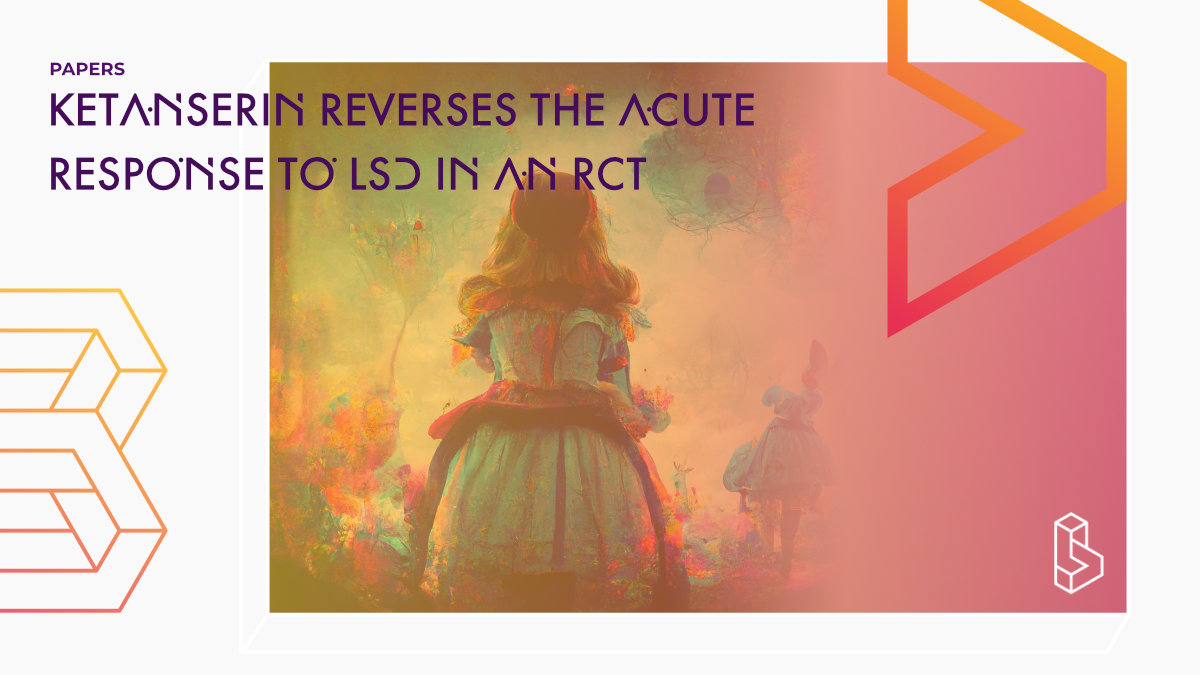This double-blind, placebo-controlled study (n=24) finds that ketanserin (40mg) administered one hour after LSD (100µg) reversed the effects cutting down the trip from an average of 8.5 to 3.5 hours. This is the first study to show that ketanserin can effectively stop/halt an ongoing psychedelic trip.
Abstract
“Background Lysergic acid diethylamide (LSD) is currently being investigated in psychedelic-assisted therapy. LSD has a long duration of acute action of 8-11 h. It produces its acute psychedelic effects via stimulation of the serotonin 5-hydroxytryptamine-2A (HT2A) receptor. Administration of the 5-HT2A antagonist ketanserin before LSD almost fully blocks the acute subjective response to LSD. However, unclear is whether ketanserin can also reverse the effects of LSD when administered after LSD.
Methods We used a double-blind, randomized, placebo-controlled, crossover design in 24 healthy subjects who underwent two 14-h sessions and received ketanserin (40 mg p.o.) or placebo 1 h after LSD (100 µg p.o.). Outcome measures included subjective effects, autonomic effects, acute adverse effects, plasma brain-derived neurotrophic factor (BDNF) levels, and pharmacokinetics up to 12 h.
Results Ketanserin reversed the acute response to LSD, thereby significantly reducing the duration of subjective effects from 8.5 h with placebo to 3.5 h. Ketanserin also reversed LSD-induced alterations of mind, including visual and acoustic alterations and ego dissolution. Ketanserin reduced adverse cardiovascular effects and mydriasis that were associated with LSD but had no effects on elevations of BDNF levels. Ketanserin did not alter the pharmacokinetics of LSD.
Conclusions These findings are consistent with an interaction between ketanserin and LSD and the view that LSD produces its psychedelic effects only when occupying 5-HT2A receptors. Ketanserin can effectively be used as a planned or rescue option to shorten and attenuate the LSD experience in humans in research and LSD-assisted therapy.“
Authors: Anna M. Becker, Aaron Klaiber, Friederike Holze, Ioanna Istampoulouoglou, Urs Duthaler, Nimmy Varghese, Anne Eckert & Matthias E. Liechti
Summary of Ketanserin reverses the acute response to LSD in an RCT, crossover study in healthy subjects
Psychedelic substances, including LSD and psilocybin, are investigated as possible treatments to assist psychotherapy. Ketanserin potently binds to the serotonin 5-HT2A receptor and adrenergic 1A and H1 histaminergic receptors and produces acute side effects, including dry mouth and sedation.
Ketanserin can prevent the acute effects of LSD and psilocybin, but it is unclear whether ketanserin can also shorten an LSD experience once the effects have already been established. LSD is a very potent substance that binds to several serotonin receptors, including 5-HT 2A, 5-HT 1A, and 5-HT 2C receptors. It also binds with lower affinity to dopamine D1-3 receptors.
LSD might be trapped in the receptor pocket in a manner that does not allow antagonism by a receptor antagonist, thus making its downstream effects irreversible. However, the duration of action of psilocybin is consistent with its plasma concentration-time curve. No 5-HT2A receptor occupancy studies for LSD in humans are yet available, but psilocybin-induced subjective effects are consistent with 5-HT2A receptor occupancy. LSD has a longer duration of action than psilocybin and therefore requires more resources to study than psilocybin. However, few studies have used LSD in modern psychotherapy studies.
Authors
Authors associated with this publication with profiles on Blossom
Matthias LiechtiMatthias Emanuel Liechti is the research group leader at the Liechti Lab at the University of Basel.
Institutes
Institutes associated with this publication
University of BaselThe University of Basel Department of Biomedicine hosts the Liechti Lab research group, headed by Matthias Liechti.
MindMed
MindMed is one of the largest companies in the psychedelics space and is developing various psychedelics for mental health disorders.
Compound Details
The psychedelics given at which dose and how many times
LSD 100 μg | 1xLinked Research Papers
Notable research papers that build on or are influenced by this paper
LSD and ketanserin and their impact on the human autonomic nervous systemThis placebo-controlled randomized, crossover study (n=17) investigated the impact of LSD (100 μg) and the counteracting influence of the 5-HT2A receptor antagonist ketanserin (40mg) on the autonomic nervous system within healthy subjects. LSD predominantly increased the sympathetic activity, while ketanserin increased the parasympathetic influence, thus antagonizing the effects of LSD on the autonomic nervous system completely. The magnitude of subjective experiences during the interventions was positively correlated with the sympathetic activity and negatively correlated with the parasympathetic activity, independent of the intervention.
Psilocybin-Induced Deficits in Automatic and Controlled Inhibition are Attenuated by Ketanserin in Healthy Human Volunteers
This placebo-controlled, double-blind study (n=16) investigated the effects of psilocybin (18.2mg/70kg) on sensorimotor gating, an automatic ability to filter unnecessary information, and controlled response inhibition, a deliberate ability to ignore conflicting information in healthy volunteers. Psilocybin disrupted both of these processes, and this effect was reversed by selectively blocking the serotonergic pathway with ketanserin (40mg) pretreatment.
Linked Clinical Trial
Effect of Ketanserin After LSD AdministrationThis study investigates whether an LSD experience can be attenuated and shortened using 5-HT2A receptor antagonist ketanserin administration after LSD once the psychedelic effects have established.

